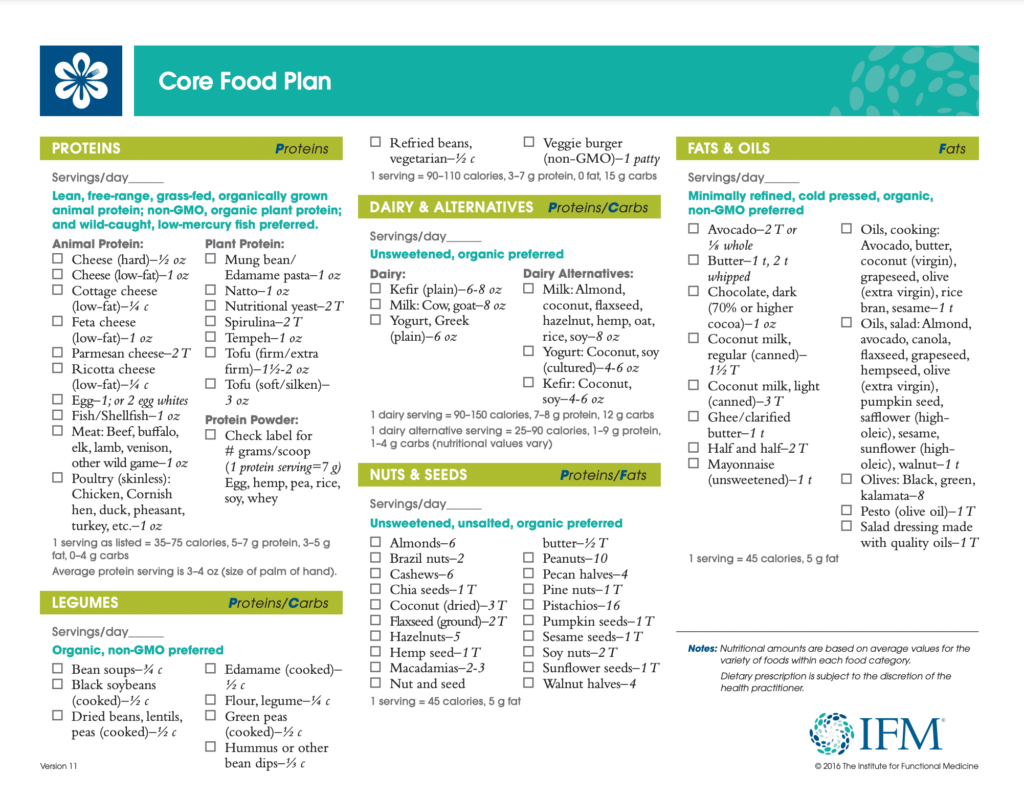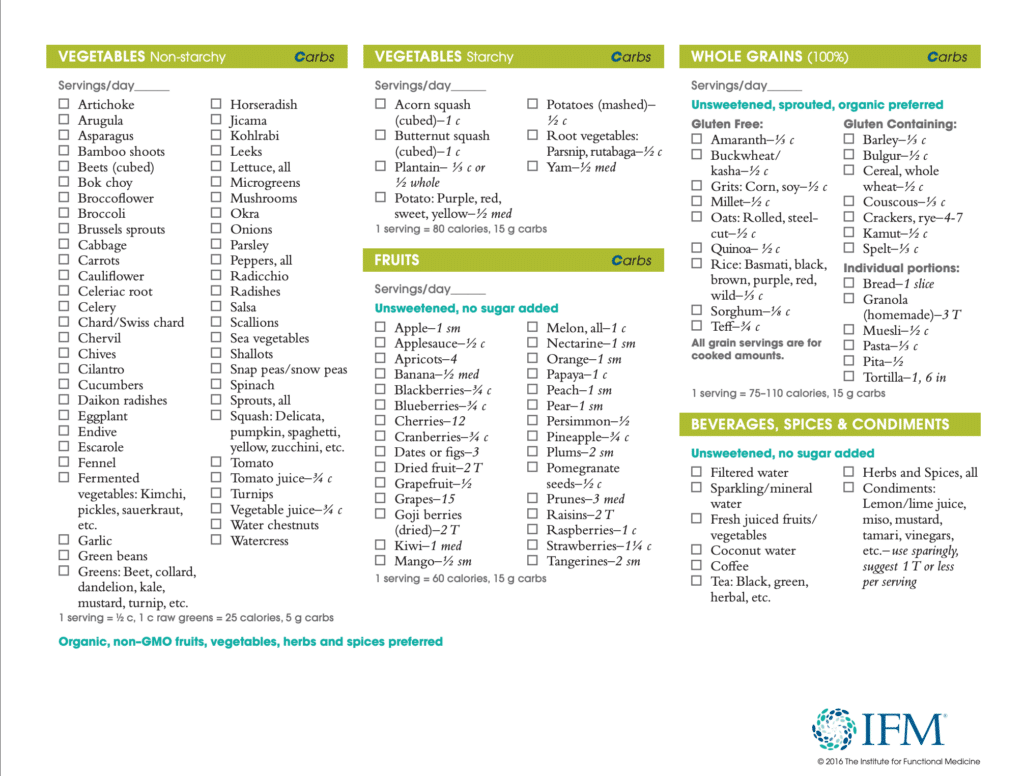“Food is medicine” is a core principle of Functional Medicine, and we mean it—literally. Food has the power to nourish, to heal, to feed our growth and prevent disease. And one of the most common ways you’ll see food “prescribed” is through a food plan.
“We can harness the power of nutrition to heal our body, balance our energy, and thrive in life.”
Dr. Elizabeth Boham, IFM Educator
What is a Food Plan?

A food plan is a specific way of eating that aligns to certain health goals. It’s a research-backed nutritional strategy that promotes quality nourishment and turns food into a tool for healing, improved well-being, and longevity, and any other desired outcomes specific to each individual and their provider.
Usually, a doctor, dietician, or other medical practitioner prescribes a food plan as a treatment for their patient’s diagnoses, symptoms, or goals. The food plan contains guidelines that encourage quality food choices, often emphasizing whole, unprocessed foods that deliver healthy proteins, fats, and nutrients while avoiding foods that may aggravate any sensitivities.
Examples of Institute for Functional Medicine therapeutic food plans include:
- Core Food Plan
- Cardiometabolic Plan
- Elimination Diet
- Detox Food Plan
- Phytonutrient Spectrum
- Mito Food Plan
- Low-FODMAP Food Plan
- Anti-Candida Food Plan
Here’s an excerpt from the Core Food Plan:


Food plans include dietary guidelines, but they are more than just a diet in the conventional sense. In addition to a breakdown of which foods and categories of foods are part of the plan and which are not, with specific instructions on what to prioritize and what to avoid, a food plan may also contain:
- Serving size guidelines
- Foods to eat or avoid at particular times of day
- Foods to eat or avoid in combination with other foods
- “Aliases,” or other names that particular ingredients go by, so that they may be identified on packaging
- Recommended swaps (e.g., swap store-bought vinaigrette with a homemade recipe)
- Recipes, serving suggestions, meal plans, and shopping lists
- Condition-specific recommendations (e.g., those who can eat dairy and those who can’t will tailor a plan to their needs differently)
- Hydration goals
- FAQs and additional resources
A good food plan will also provide educational/background information on key aspects of the plan and why they matter, so that the individual can “buy in” to the changes they’re making and understand why those changes will help move them toward their desired outcomes. The more an individual is aligned to the food plan and tapped into their internal motivation to change, the more likely they are to succeed (more on this in the last section of this article).

Who Uses Food Plans?
Anyone may use a food plan! That said, not every food plan will make sense for every individual.
The Core Food Plan, for example, is broadly appropriate for long-term use by people of all ages and body sizes. Its goal is to provide a foundation of healthy eating principles that nurture a healthy microbiome and serve the individual throughout their life.
The Cardiometabolic Plan is an example of a food plan often prescribed for those with particular risk factors or diagnoses. It has a lot in common with the Core Food Plan, but it’s customized so that it aligns with the specific health goals of those for whom it’s often prescribed.
The Elimination Diet, on the other hand, is a targeted intervention used to identify intolerances and sensitivities, rather than a long-term change in an individual’s approach to eating. Typically, an individual only adheres to the Elimination Diet for 3 weeks, after which they will work with their provider to integrate the new information they’ve gleaned into their future food choices.
As you can see, some food plans are more broadly applicable, while others are most appropriate for people with specific diagnoses or health goals. Still other food plans are used only as short-term interventions. The healthcare provider prescribing the food plan will ensure it is suitable for each individual’s needs.

This description may make food plans sound highly prescriptive, but many are actually quite flexible. They may be customized for each individual’s physical, mental-emotional, and spiritual needs, allowing for adaptation to the client’s unique tastes and preferences. A food plan typically:
- Removes foods that contain allergens, trigger sensitivities, increase inflammation, etc.
- Increases foods to address nutrient deficiencies
- Tailors nutrition to any specific diagnoses and/or disease prevention
- Aligns with religious or lifestyle preferences (e.g., halal, kosher, vegan)
- Incorporates cultural and ethnic food traditions
- Cultivates a new awareness of food and eating patterns
- Improves overall health and well-being
How Do Functional Medicine Certified Health Coaches Use Food Plans?
Making changes to your diet can be notoriously difficult, and for some clients, a food plan represents an almost total overhaul of their way of eating. So it should come as no surprise that adapting to food plans is one of the most common ways Functional Medicine Certified Health Coaches (FMCHCs) support their clients.
When a client is going on a new food plan, their FMCHC might:
- Walk the client through the food plan to make sure they understand
- Answer questions and offer support as the client processes the change ahead of them
- Brainstorm and research recipe ideas
- Assist in meal planning and building shopping lists (see the Instagram post below for an example of nutrient-specific shopping list inspiration a coach might offer)
- Listen to the client’s frustrations and help them problem-solve
- Recognize and celebrate successes
Research shows that FMCHCs can make all the difference when it comes to a patient successfully adapting to a food plan. In FMCA and IFM’s recent study, participants on the Elimination Diet who worked with an FMCHC had better food plan adherence and better health outcomes than did the self-guided control group. In short, working with a health coach was key to sticking to the Elimination Diet and getting good results!
It’s important to note that health coaches do not prescribe food plans. Instead, they partner with their clients, and sometimes with their clients’ healthcare providers, to implement a prescribed food plan and stick to it. They are the behavior change experts who enable their clients to successfully implement their food plans and work toward their health goals.

Food plans harness our food’s healing potential. They provide highly effective interventions for a range of health concerns and goals, and a food plan exists for virtually every individual at any stage of their health journey. And while food plans may seem complex or intimidating, the collaborative support of a Functional Medicine Certified Health Coach can unlock all the benefits this transformative health tool has to offer.
For more on food as medicine, check out our recent blog post here.
Our Latest Blogs
-

Would You Be a Good Health Coach?
Read Full Article: Would You Be a Good Health Coach? -

Food Sensitivity Testing 101: Supporting Clients with Inflammation and Gut Issues
Read Full Article: Food Sensitivity Testing 101: Supporting Clients with Inflammation and Gut Issues -

Protein 101: The Health Coach’s Guide
Read Full Article: Protein 101: The Health Coach’s Guide

